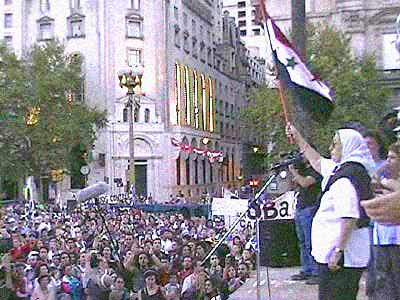Argentina's Supreme Court overturns amnesty laws
The legislation that benefited around 1,000 military officers that committed crimes against humanity in the 1970s is unconstitutional

Around 1,000 Argentine military officers that committed crimes against humanity during the bloody rule of the juntas between 1976 and 1983 can be now prosecuted, after the Supreme Court of Justice of this South American nation overturned on Tuesday amnesty laws voted in the eighties stating that they are unconstitutional. Seven out of the nine members in the superior tribunal voted to rule against the controversial laws, which the National Congress had previously nullified in 2003.
The rule was expected by the Argentine society since President Nestor Kirchner's administration championed a renewal of the former discredited Supreme Court of Justice by Congress impeachment. The new tribunal is now composed by internationally well reputed judges, whose rules are under international human rights standards.
Despite versions on the contrary, the Armed Forces did not show signs of uneasiness. Army chief Roberto Bendini, told the press that his force “was aware of the rule”, which expects it bring “peace and fraternity to the society.” “We think that the Justice has to investigate the allegations and conclude who is guilty and who isn't”, said Mr. Bendini at press request.
Human rights organizations from all over the country celebrated the rule, while the most representative of them honoured the victims of the illegal repression ordered by the military juntas that killed around 30,000 of civilians, according to independent records. Also, on line polls at the main news engines showed an overwhelming support of the population to the Court.
Human rights groups as the “Madres de Plaza de Mayo” (mothers of those killed or “disappeared” under the dictatorship) and the “Abuelas de Plaza de Mayo” (grandmothers) said they celebrate because criminals will now be prosecuted by Argentine courts. “We had to share our lives with thieves and murderers”, said Estela de Carlotto, the leader of the Abuelas…, a civil association that looks for the children born in captivity and stolen from their relatives by military officials.
Only conservative politicians expressed some concern over the overturn of the amnesty laws voted by the Congress in the eighties under serious threats from the military. Conservative leader Maurizio Macri said that the rule “wasn't coherent” with former sentences.
During the US backed military juntas that ruled Argentina between 1976 and 1983, around 30,000 opponents were killed or simply “disappeared” in what local authorities called a “dirty war” against subversive militants. The chiefs of the three Armed Forces Army, Navy and Air Force) were tried and condemned by a civil tribunal in 1985 fuelled by the constitutional administration of President Raul Alfonsin.
However, amnesty laws voted by the Congress in 1987 under increasing unrest within the military blocked prosecutions and left unpunished thousands of crimes. The new legal status will allow courts to re-open filed demands, which involve hundreds of free military personnel.
On the photo: Relatives of the victims, with the typical white handkerchiefs covering their heads, have been demanding justice since persecutions began in the seventies.
Subscribe to Pravda.Ru Telegram channel, Facebook, RSS!


